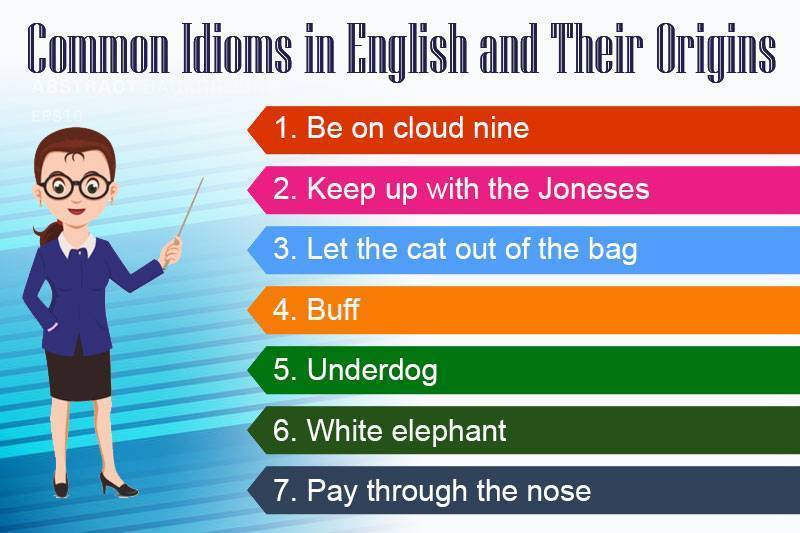Common Idioms in English and Their Origins

Idioms add colour and flourish to the language and it is very interesting to know how they originated. Anyone who wants to learn English will have to learn these expressions that make the English language so much more interesting and vibrant. Here are a select few.
1. Be on cloud nine
If we say that someone is on cloud nine, we mean that he is very happy or elated.
How did this idiom originate? It originates from a practice of the US weather bureau which identifies different types of clouds. The highest type, which is found at over 10,000 meters, is called cloud nine. Now, ‘high’ is a word that is often used to denote extreme happiness or euphoria. Hence, cloud nine being the highest cloud, came to refer to the heights of happiness.
2. Keep up with the Joneses
When you try to keep up with the Joneses, you always buy/do what one’s friends and neighbors buy /do in order to seem as rich as they are.
Arthur R. Momand, an American cartoonist started writing a comic strip for the New York Globe in 1913 and it ran for 28 years. It was called ‘Keeping Up with the Joneses’, and came from his own experience of married life in Cedarhurst, Long Island, where he had to buy things just to be equal to or keep up with his neighbors.
3. Let the cat out of the bag
This means ‘to reveal a secret by mistake’.
In village fairs in Britain, piglets used to be sold in bags. These bags were not opened by the buyers until they reached home. Some of the sellers at the fair were less than honest and put cats into the bags instead of piglets. When the bag was opened at the buyer’s home, the cat would jump out and the secret would be revealed. Thus, when you let the cat out of the bag, you are revealing a secret.
4. Buff
A buff is a person who knows a lot about a particular subject/area of human enterprise even if it is not really his official business to know so much about it.
The word originated in the last century in New York City where amateur firefighters helped the official firemen to put out blazes. The amateur enthusiasts were called buffs because of their coats made out of buff leather. This was a pale yellow leather coat made from buffalo hide. Today its meaning has widened so that one can use it to describe people who are interested in many different subjects; you could meet a wine buff, a music buff, a gardening buff or a basketball buff for example.
5. Underdog
An underdog is someone who is almost certain to fail/lose a competition/argument/war etc.
A common way of using it is in the expression support the underdog. One theory about its origin is that it came from the time when dogfighting was popular. The dog that was strongest was called the top dog (which can be used of people today) and the animal that was more likely to lose was called the underdog. ‘The Under Dog in the Fight’ is a 19th century song which ends:
“But for me, I shall never pause to ask
Which dog may be in the right,
For my heart will beat, while it beats at all,
For the underdog in the fight.”
6. White elephant
A white elephant is something which is expensive but useless/something which is costly to keep and has no apparent benefits.
This expression comes from Thailand. A long time ago in Thailand, if a white elephant was born in the country, the king would claim it for himself and rear it. However, if anyone displeased the king in some way, the king would give the white elephant to him. This would soon ruin the hapless fellow because the upkeep of a white elephant took a lot of money.
7. Pay through the nose
When you pay through the nose, you pay a high price for something which is not worth it.
This expression relates to a tax imposed by the Danes on the Irish during the 9th century. The punishment for not paying the tax was nasty. One’s nose was cut open with a knife. A related slang term is rip-off, which means cheat someone by making them pay through the nose.

